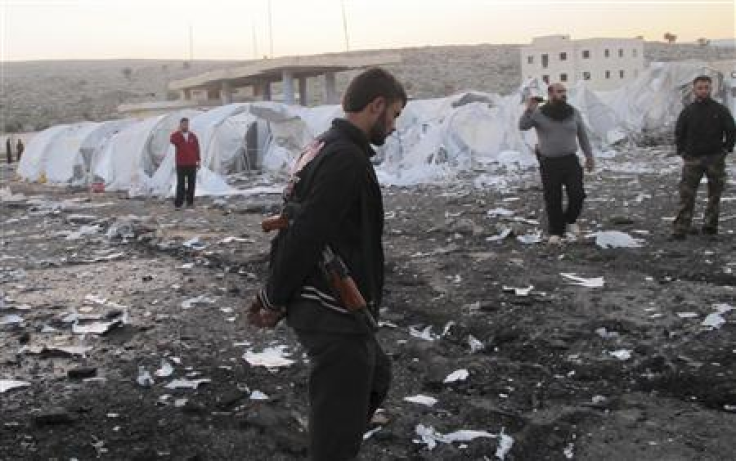Syria Airstrike Kills Civilians; Rebels Claim Gains

Syrian air force planes attacked towns in the north and east Tuesday and killed at many civilians in a strike on an olive oil press while fighting raged in Damascus, opposition activists said.
Two anti-regime activist groups — the Britain-based Syrian Observatory for Human Rights and the Local Coordination Committees — said the factory was hit Tuesday near the northern city of Idlib.
The Observatory said "tens were killed or wounded," the Associated Press reported, while the LCC said at least 20 people were killed. Syria restricts independent media coverage, making it difficult to determine the exact toll.
The latest fighting follows recent gains by the rebels in their struggle to topple President Bashar al-Assad, but it is far from clear if a strategic breakthrough is likely.
More than 90 people were killed on Tuesday, the Observatory told Reuters.
Rebels trying to make inroads into Damascus battled government forces in the suburb of Kfar Souseh, activists said.
In Aleppo province in the north, rebels shot down a military helicopter, according to video footage posted on YouTube that showed what appeared to be a missile hitting the aircraft.
Security sources and activists have reported a small but growing number of heat-seeking anti-aircraft missiles entering Syria, weapons the rebels would need to stand any chance of overcoming Assad's increasing reliance on air power.
The video could be one of the first clear indications that such weapons are in use. The Local Coordinating Committee opposition group said the Free Syrian Army had downed the helicopter near the Sheikh Suleiman army base, 30 km (20 miles) northwest of Aleppo.
Hilal Khashan, a political science professor at the American University of Beirut, told the AP the air force is being used in areas that the overstretched army cannot easily reach.
"This is mass punishment," Khashan said. "The regime is desperate and wants to make the price of its opponents' victory costly."
Although they have yet to seize a single city or translate their dominance in swathes of rural Syria into “liberated” territory free of air and artillery strikes, the rebels say their increasing prowess on the battlefield and growing armories have finally allowed them to take the initiative.
“The difference is that we’ve gone from being on the defensive to thinking and acting on the offensive. We actually have the ability to work offensively now, since we have seized enough weapons,” an Islamist fighter near Damascus, Abu al-Yaman, told The Daily Star of Beirut.
A Damascus-based diplomat said Assad still had 70,000 to 80,000 soldiers stationed around the city and its outskirts. There are no clear figures for the size of the rebel brigades but they say they number tens of thousands nationwide.
“People I have spoken to who are in touch with very senior Syrian officials report a sense of calm among generals and senior officials,” the envoy in Damascus said. “I can’t understand that, unless they are simply putting on a brave face ... Every ordinary Syrian I speak to is worried. They see the train crash coming.”
U.N. Special Coordinator for the Middle East Peace Process, Robert Serry, told the U.N. Security Council Tuesday that around 450,000 people are now believed to have fled Syria, with even more displaced inside the country.
"Destruction, death and suffering have become part of daily life across Syria," Serry said. "The humanitarian crisis is becoming more acute with the winter upon us and the number of those in need growing, potentially reaching 4 million inside Syria by the end of 2012."
International Syria mediator Lakhdar Brahimi is due to brief the 15-member council on Thursday and the U.N. General Assembly on Friday. There is diplomatic deadlock between Western powers, who broadly support the opposition and Assad's supporters Russia and China which have blocked Security Council action.
Syrian state television said two people were killed and four wounded in a "terrorist suicide car bomb" in Artouz, near Damascus. The Observatory said the explosion was caused by a car bomb next to a military police checkpoint.
Near the Old City in Damascus, a car bomb killed one person and blew the legs off another man, according to opposition activist Samir al-Shami. He said it was unclear if the car, a white Toyota, was rigged by Assad loyalists or rebels.
In northern Idlib province, a government jet dropped barrel bombs - cylinders packed with explosives and petrol - at the Abu Hilal olive oil press, 2 km (1.2 miles) west of Idlib city, activist Tareq Abdelhaq said.
At least five people were killed and five wounded in the attack, according to the Observatory. Abdelhaq placed the number much higher, citing locals saying that at least 20 were killed and 50 wounded.
Activists said the victims were civilians waiting to press their olives for oil, but they said opposition fighters were in the area. It was unclear if there were any rebel targets nearby.
© Copyright IBTimes 2024. All rights reserved.











